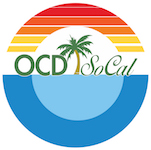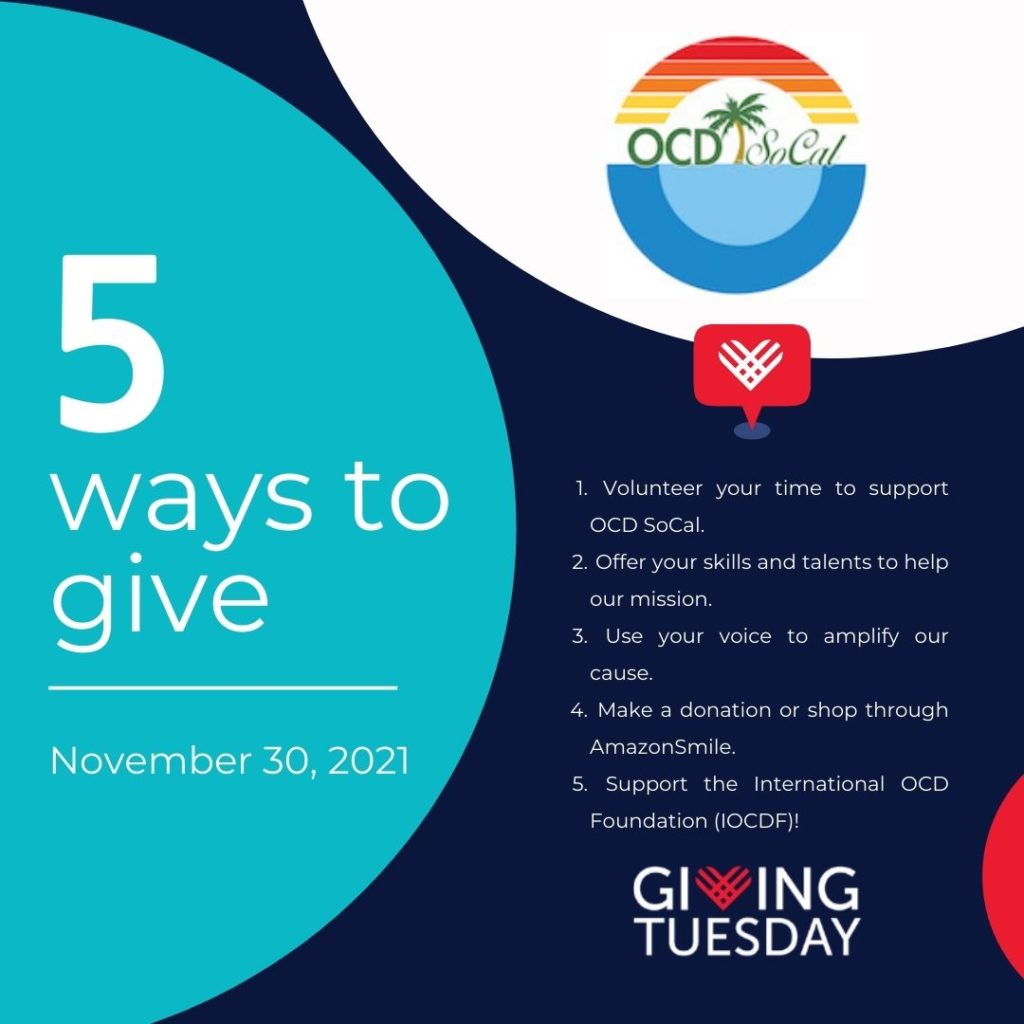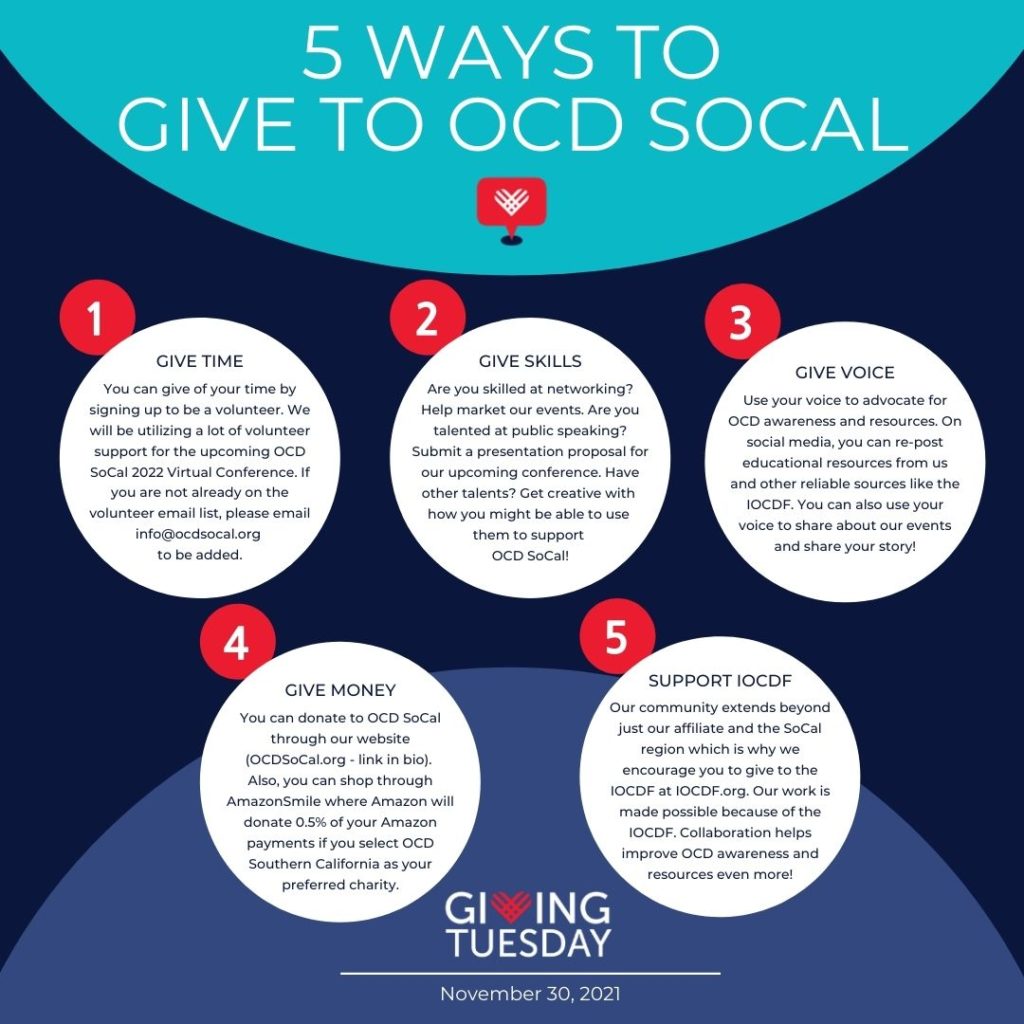Following the conference’s keynote, there will be a total of 40 break-out sessions offered during four consecutive time slots. Ten breakout sessions will be offered during each time slot– which are being led by some of the top OCD experts in the United States. Break-out sessions offered include panels, community discussion groups, and OCD documentaries. Purchase your tickets to OCD Southern California’s 6th Annual Conference: A Virtual Event, here: PURCHASE CONFERENCE TICKETS HERE!
Here is a list with details of the break-out sessions being offered:
Session I: 11:15am – 12:30pm PST
| What Drives Family Accommodation and What to Do About It: Across the Lifespan – Barbara Van Noppen, Ph.D., Melissa Mose, LMFT, Felicity Sapp, Ph.D., Michelle Dexter, Ph.D. In an effort to cope with challenging situations, families often engage in behaviors that perpetuate OCD and interfere with treatment. This workshop will discuss these behaviors and introduce behavioral contracting, which is a family-based intervention that unites family members in the therapeutic process of exposure and response prevention. Especially for children/adolescents who refuse treatment, the Supportive Parenting for Anxious Emotions is a hopeful alternative. |
OCD 101: An Introduction to Obsessive-Compulsive Disorder – Jackie Shapin, LMFT and Kimberley Quinlan, LMFT
An important part of OCD recovery is psychoeducation about obsessive-compulsive disorder and its treatment. In this presentation, participants will learn what OCD is, the difference between obsessions and compulsions, and the differences between gold-standard treatment modalities.
| Understanding and Treating Emetophobia – James Claiborn, Ph.D. and Katie Barber, clinical intern, CBT Baltimore Emetophobia or fear of vomiting is both a common specific phobia and a common complaint of people with OCD and health anxiety. This phobia has been the subject of only limited research but there are carefully described approaches to treating it with CBT including exposure. This presentation will cover the disorder and its treatment. |
Ask The Experts… Live! – Chris Trondsen, M.S., AMFT, APCC, Elizabeth McIngvale, Ph.D., LCSW, Ethan Smith, IOCDF National Advocate, Rev. Katie O’Dunne, IOCDF Lead Advocate
During the height of the pandemic, the IOCDF began to offer virtual programming to keep the OCD community informed and connected. “Ask The Experts,” featuring clinicians Liz and Chris, is teaming up with “Community Conversations,” hosts Ethan and Katie, two individuals with OCD. They are going to be taking your OCD and related disorders questions live at our conference! Attendees will have a chance to ask questions and receive answers from both clinical and personal perspectives!
| OCD & Young Adults: The Stages of Life – Kyle King, IOCDF Advocate, Meg Dailey, IOCDF Advocate, Ez Homonoff, IOCDF Advocate, Micah Howe, IOCDF Advocate, Kristina Orlova, LMFT This panel, aimed towards individuals with OCD ages 18 to 30 and their family members & loved ones, offers young adults a safe space to gain peer support and communicate challenges unique to this stage of live including dating and OCD, navigating college, building an identity outside of OCD, working with the disorder, and more! During this conversation, free-flowing discussion and interactive participation involving attendees is encouraged to create a sense of community. |
Body-Focused Repetitive Behaviors (BFRBs): OCD or not? – Karen Pickett, LMFT
In this presentation, distinctions and similarities between BFRBs and OCD will be clarified. Although BFRBs are classified in the DSM as a subtype of OCD, there are important factors to consider in the diagnosis and treatment of BFRBs that differ from OCD. Important factors involved in treatment of BFRBs that differ from the treatment of OCD will be presented.
| Acceptance and Commitment Therapy with ERP for OCD – Evelyn Gould, Ph.D., BCBA-D, Danielle Moskow, clinical psychology Ph.D. student This presentation is for therapists with an understanding of exposure therapy, and will discuss how to incorporate acceptance and commitment therapy (ACT) into treatment for adolescents and adults with OCD. This presentation will discuss the ins and outs of ACT, how to frame treatment in the context of OCD, and how ACT can be used in conjunction with ERP for OCD. |
Don’t Try Harder, Try Different. A (humorous) Stress Management Approach to OCD – Patrick McGrath, Ph.D.
What if there was a better way to get relief that was lasting and did not involve compulsion? Well, look no further than trying different versus trying harder to get your compulsions just right. Join Dr. McGrath as he walks you through the cognitive and the behavioral to get you to looking forward to doing response prevention!
| Self-Disclosure: If, When, and How to Open Up About Your OCD With Family, Friends, Lovers, and Employers – Kevin Foss, MFT and Laura Yocum, MFT OCD can make someone feel desperately isolated, and the thought of letting someone in, even someone we know and love, feels terrifying. This presentation will directly address these and other questions with the goal of helping attendees evaluate if, when, and how to broach the subject of their OCD in personal, professional, and intimate relationships. |
OCD & Kids – Willa Marquis, Ph.D., Jennie Kuckertz, Ph.D.
This talk will highlight specific strategies that can help both kids (ages 12 and under) and parents feel more successful in facing challenges from OCD. This presentation will include significant time for parents to ask questions and interact with the presenters and each other.
Session II: 12:45 – 2:00pm PST
| OCD Medication: Individualized and Targeted – Lance Steinberg, MD This presentation will guide you or your psychopharmacologist to the use of FDA approved monotherapy, choosing the best agent for your needs and sensitivity. Then, an understanding of therapeutic levels, potential drug interactions, then the various levels of augmentation strategies. |
Comprehensive Behavioral (ComB) Treatment of BFRBs – Charles S. Mansueto, Ph.D.
Both Hair Pulling Disorder (also called Trichotillomania) and Skin Picking Disorder (also called Excoriation Disorder) are legitimate clinical disorders. Comprehensive Behavioral (ComB) Treatment model provides a guiding, comprehensive, conceptual framework that encompasses and integrates sensory, cognitive, affective, motor and environmental variables. ComB treatment will be described in detail and its unique advantages over other BFRB treatments.
| Obsessive-Compulsive Symptoms in Asian American Women: How to Improve Treatment Through Cultural Competency – Eda Gorbis, Ph.D. This presentation aims to examine obsessive-compulsive symptoms in Asian American women populations while taking a deeper look into how OCD presents in this particular population. Taking cultural values into account, we will establish how treatment can be adjusted to fit the needs of immigrant women and will display current treatment modalities in work. |
Uncovering OCD: The Truth about OCD – Ethan Smith, IOCDF National Advocate
Through candid personal stories and interviews, this real, raw, and emotional documentary dispels the common myths surrounding OCD. It takes an in-depth look at the disorder and the role it takes on sufferers and families– and underscores the reality that there is always help and always hope.
| When Shame Fuels OCD – Jessica Serber, LMFT, Kimberley Quinlan, LMFT, Alegra Kastens, LMFT, Chris Trondsen, M.S., AMFT, APCC Shame is a painful, isolating, and powerful emotion with many implications for one’s mental health. It can act as fuel for OCD, particularly in themes related to perfectionism, taboo intrusive thoughts, hyper-responsibility, and scrupulosity. In this talk, we will discuss the various roles that shame plays in OCD and help you gain a deeper understanding of this complex and common emotion as well as address how to implement tools and techniques to combat it in your or your clients’ lives. |
Perfectionism & OCD: The False Pursuit of Certainty – Menije Boduryan-Turner, Psy.D.
Perfectionism frequently plays a role in the OCD cycle, fueling the endless pursuit of certainty and providing a false sense of safety. Through exposure, you can get unstuck and feel empowered, by learning to do things imperfectly, embracing imperfection, sitting with discomfort and practicing self-compassion.
| Laughing in the Face of Fear: Using Humor to Support Exposure and Response Prevention – Kelley Franke, MFT This talk will focus on how those with OCD can flip the script on fear through: Exposure ideas (Watching comedy with triggering jokes)- Responding to thoughts (well, we’ll, well, fancy meeting you here)- Noticing feelings (oh, anxiety, you’ve decided to grace us with your presence…)- and more! The presentation will also explore how making light of our thoughts and feelings can be the biggest exposure of all. |
A Family’s Journey Navigating OCD + UNSTUCK: An OCD Kids Movie – Chris Baier, IOCDF Advocate, Ali Hodin-Baier, Vanessa Baier, Charlotte Baier
When Vanessa Baier developed severe OCD as a child, her family found her life-changing ERP Treatment. Chris later produced “UNSTUCK: An OCD Kids Movie” with documentary filmmaker, Kelly Anderson. Charlotte, Vanessa’s younger sister joins Chris, his wife Ali, and Vanessa for this discussion–and showing of UNSTUCK, a family-friendly short film that lets kids and teens speak truthfully about Obsessive Compulsive Disorder (OCD).
| Parents and Loved Ones of Children with PANDAS and / or PANS: A Community Discussion Group – Susan Boez, President, IOCDF, Melissa Mose, LMFT This interactive discussion group will provide strategies for managing the confusing symptoms of PANS and PANDAS and an opportunity to meet others who understand both the complexities of the illness and the ramifications it can have on family life. |
Love, Marriage & OCD – Erin Ramachandran, MHA, Psy.D. student, Keith Ramachandran, Michaela Culkin, Ph.D., David Culkin, Ph.D.
Through this panel, multiple couples will share in a Q&A style real-life experiences, stories and solutions to common challenges within the couple relationship with OCD. They will also answer questions from the audience to tackle their current challenges to bring them hope in the relationship despite OCD.
Session III: 2:15 – 3:30pm PST
| OCD Treatment For Diverse Populations From a Diversity, Equity, and Inclusion Lens – Chris Trondsen, M.S., AMFT, APCC, Jelani Daniel, M.A., LPC, Marci Rabinowits, Psy.D. This panel provides clinicians with education and tangible and practical strategies to interact with diverse populations through a lens of diversity, equity, and inclusion. Furthermore, this panel focuses on educating clinicians on steps they can take to become a more inclusive treatment provider. |
Community Discussion Group for Therapists with OCD – Andrew Cohen, LMFT and Danielle Cohen, LMFT
This community discussion is for therapists who specialize in the treatment of OCD, who have OCD themselves. Therapists will get to discuss how they deal with their countertransference during sessions and how they handle becoming triggered during sessions.
| Neuromodulation Treatments for OCD – Adam Frank, MD, Ph.D. Current treatments for treatment-refractory OCD include transcranial magnetic stimulation (TMS) and deep brain stimulation (DBS). These treatment modalities will be reviewed, including indications for use, clinical implementation, and evidence for their efficacy. Emerging neuromodulation treatment options that are still under investigation will also be explored. |
Navigating Faith & OCD – Rev. Katie O’Dunne, IOCDF Lead Advocate, Valerie Andrews, IOCDF Lead Advocate, Dr. Caitlin Claggett Woods, C.Psych, Justin K. Hughes, M.A., LPC
Despite how convincing OCD might seem, OCD is not a faith issue. Rather, OCD is simply latching onto your specific beliefs to get you to pay attention. This presentation will offer unique perspectives from clinicians, faith leaders, and individuals with OCD as we seek to show that faith and mental health do not have to be mutually exclusive.
| Hear My Story: OCD Series Documentary – Josh Oxendine, founder “Hear My Story” This documentary features four individuals with OCD who were willing to let us walk with them for a day in their life where they were able to explain thoughts attached to their compulsions. We spoke with their families to understand what support has looked like for them and therapists shared their professional knowledge in order to bring a deeper and more educated understanding of this disorder. |
Navigating Insurance: A General Users’ Guide – Shannon Switzer, Peer Support Specialist, Dr. Allison Solomon, Psy.D.
Navigating the confusing world of insurance adds another layer of complexity to treatment, as well as countless acronyms and terms to sift through… PPO, HMO, EOB, FSA, single case agreements, superbills, reimbursements, etc…. Join us as we unpack some common terms and explore general tips for navigating insurance for you or your loved one.
| OCD in the Bedroom – Talk + Q&A – Alegra Kastens, LMFT, Jessica Serber, LMFT, Kimberley Quinlan, LMFT Join us for a talk that will both normalize and flesh out the impacts of OCD on sexual intimacy. Sex can become be a source of stress for someone with OCD, especially for those experiencing sexual obsessions, relationship obsessions, sexual orientation obsessions, and if medication to help alleviate symptoms of OCD causes sexual side effects, such as decreased libido or inability to orgasm. |
Understanding and Navigating Mental Compulsions – Lauren Rosen, LMFT, Kelley Franke, MFT, Kevin Foss, MFT, Elena Fasan, LMFT
This talk will arm you with the information you need to identify and disengage from mental compulsions, including how to distinguish mental compulsions from obsessions. You can learn to take back control of your life!
| Choosing Greater Good: Navigating OCD with the Power of Purpose and Service – Jeff Bell, author, founder of A2A Alliance Fear and doubt are powerful motivators of OCD behaviors. For author and A2A Alliance founder Jeff Bell, this was a lesson learned while living a double-life as a radio news anchor secretly consumed by compulsions. Jeff will share his remarkable journey and the Greater Good Perspective Shift he developed to help navigate OCD recovery. |
OCD & Teens – Melissa Mose, LMFT, and Evelyn Gould, Ph.D., BCBA-D
For parents, family members, and their 13 to 18-year-old teenagers with OCD, understanding some key issues will help the whole family avoid needless suffering. New social situations, academic concerns, and growing independence, not to mention a rapidly changing brain and body, are all facets of adolescence that make OCD treatment even more complicated. This interactive workshop will address these challenges, as well as help build communication skills and better understanding. Teens and family members are encouraged to attend together.
Session IV: 3:45 – 5:00pm PST
| Evidence-Based Strategies in the Treatment of Hoarding Disorder – Robin Zasio, Psy.D., LCSW Cognitive Behavioral Therapy (CBT) is used to help with distorted / negative thinking patterns that contribute to the excessive acquisition and the difficulty letting go. Exposure and Response Prevention (ERP) assists in helping individuals begin to let go and test whether what their feared consequences will in fact occur. This presentation will outline the theory and application of CBT and ERP with case examples to illustrate their effectiveness. |
Culturally Responsive and Sensitive Approaches for Treating OCD in LGBTQ+ Populations – Kevin Narine, B.A., Andreas Bezahler, B.S., Lauren Wadsworth, Ph.D., ABPP, Chris Trondsen, M.S., AMFT, APCC
LGBTQ+ individuals experience greater rates of OCD compared to the general population. Gender minorities also experience fewer improvements and longer stays in treatment than cisgender men and women with OCD. Such research highlights mental health inequities that must be addressed and emphasizes the need for culturally responsive and sensitive approaches to treating OCD in LGBTQ+ individuals.
| OCD Success Stories Panel – Justin Nichols, Patricia Bouissou, Shamika Williams, Keith & Erin Ramachandran with Moderator Andrew Cohen, LMFT This panel gives conference attendees an opportunity to hear personal stories from a group of individuals with OCD and their loved ones who have all been successful in treatment and now live fulfilled lives. Personal stories are some of the most inspirational for conference attendees and attendees will walk away from this talk inspired and hopeful. |
Peer Support – Transforming Your Story Into a Career – Shannon Switzer, Peer Support Specialist and Shannon Shy, Peer Support Specialist and author
Have you ever wondered how you can transform your story, your journey of OCD recovery, into a career? Join us as we dive into the world of peer support, a career that values your lived experience and utilizes it to help others navigate resources, know they are not alone, and feel empowered on their journeys of recovery.
| When You Have OCD About Treatment: Getting Unstuck and Moving Forward with Your Life – Jennie Kuckertz, Ph.D. Exposure and Response Prevention (ERP) can be incredibly effective, but what if you have OCD about treatment? We’ll talk about ways to move forward by accepting uncertainty, showing curiosity, and practicing flexibility, and the importance of pausing to re-orient ourselves towards living the life we want. |
Eating Disorders: Are they just another subtype of OCD? – Jennifer Lafferty O’Connor, Ph.D.
Eating Disorders at their core involve recurrent distressing intrusive thoughts about food, weight, and body. Join this conversation to learn more about how exposure with response prevention therapy can be the key to unlocking a mind that is trapped by food and body-related obsessions. We will also discuss the ways that eating disorders can shape shift into different forms over time.
| Supporting ERP with Self Compassion and Internal Family Systems – Melissa Mose, LMFT and Kimberley Quinlan, LMFT Self-compassion has been shown to provide a significant advantage for clients who are perfectionistic and hard on themselves. Internal Family Systems (IFS) is an evidence-based approach that fosters the clients’ ability to access the compassion, curiosity, and courage to encounter their fears and face them without wishing them away. With the addition of these protocols, exposure therapy is deepened and enhanced, and treatment outcomes can be significantly improved. |
OCD & Anxiety in the Schools – Abigail M Stark, Ph.D., Brittany Jordan-Arthur, Ph.D., Rachel Davis, MD
This talk aims to provide information on best practices to support children, adolescents, and young adults with OCD in schools (elementary school through college). We aim to discuss implementation of exposure therapy within school systems, challenges of implementing exposure therapy in schools, and recommendations for school accommodations across the developmental spectrum (K-12 and within college).
| Siblings and OCD: Considering the Often Overlooked Family Member – Michelle Witkin, Ph.D. When one child in a family has OCD, the entire family is impacted. Yet, all too often, the siblings in the family are not considered. In this presentation, we will look at how brothers and sisters can be impacted and specific ways to support them and help them thrive. Real examples will be drawn from and participants are invited to share solutions they’ve found in their families. |
Treating Body Dysmorphic Disorder (BDD): A Comprehensive Approach – Scott Granet, LCSW, Robyn Stern, LCSW, Amanda Rosenberg
This presentation focuses on specific treatment strategies and exposures for common BDD obsessions (nose, acne) and compulsions (mirror checking, reassurance seeking). Additionally, the presentation will focus on other areas of BDD treatment including addressing negative core beliefs, identifying contributing factors such as bullying and teasing, processing emotions during ERP for BDD, understanding the influence of cultural factors in appearance obsessions, and aiding the client in finding self-worth outside of their appearance.
—
Purchase your tickets to OCD Southern California’s 6th Annual Conference: A Virtual Event, here: PURCHASE CONFERENCE TICKETS HERE!






